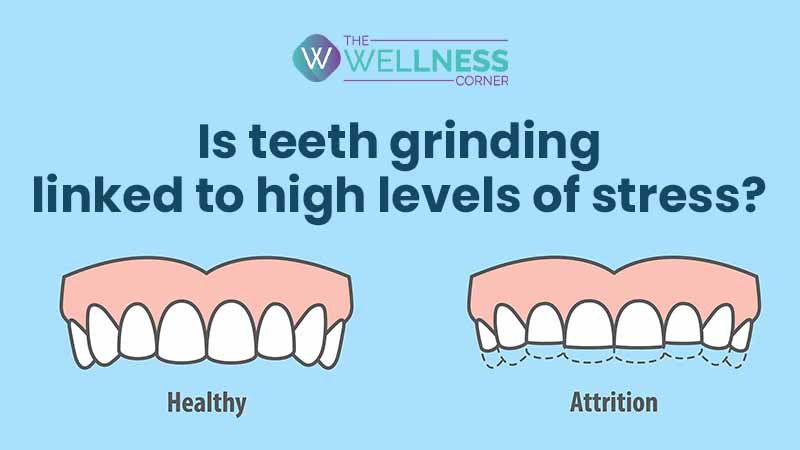What is Bruxism or Teeth Grinding?
Bruxism or teeth grinding is a condition in which you unconsciously grind or clench your teeth. You may have teeth grinding when sleeping (sleep bruxism)or when awake (awake bruxism). Teeth grinding in sleep might cause other sleep disorders such as sleep disturbance, snoring, or sleep apnea (pauses in breathing).
Bruxism might be mild or severe. If you suffer from mild bruxism, you might not require treatment. But if you have severe bruxism, you will need treatment because it might lead to tooth pain, headaches, jaw disorders, or damaged teeth.
How teeth grinding and jaw clenching are related to stress and anxiety?
Bruxism or teeth grinding might be caused by several factors such as certain medications, age, tobacco, alcohol, or recreational drugs. But stress and anxiety are also leading factors behind teeth grinding. Especially in adults, there is a prominent relationship between bruxism and stress. In addition, it has been seen in scientific studies that people who have stress and anxiety issues grind their teeth more than people who do not have anxiety and stress issues.
It has also been seen that people who have bruxism have high levels of stress hormones. According to scientific research, a person's heart rate and brain activity increase before a grinding episode which means that your nervous system plays a significant role in causing bruxism.
If your nervous system is causing bruxism, that means that your teeth grinding is not only a physical issue, but your psyche is also involved. Your body and mind are closely related to each other. Many people exhibit their mental problems through physical actions. Many times, headaches or stomach problems might be the physical outcomes of some mental health conditions. Similar is the case with bruxism or teeth grinding.
Stress increases adrenaline in the body, which increases the body's energy leading to teeth grinding, especially when you are not moving your body. In addition, when the stress hormones in the brain cause anxious thoughts, the stress hormones increase to cause physical reactions such as fast heartbeat or jaw clenching. Stress and anxiety also lead to the release of hormones like cortisol, serotonin, and dopamine, which will cause sleep disturbance and lead to teeth grinding in sleep.
How to care for stress and avoid bruxism?
Stress management is a great way to avoid bruxism. You can follow certain stress management strategies to prevent teeth grinding as a result of stress and anxiety.
Exercise
You can destress yourself by exercising every day for at least thirty minutes. Exercise can reduce stress and consequently bruxism. Brisk walking might also help you to relax. You can also consciously relax your jaw several times a day to eliminate the habit of jaw clenching.
Meditation
Meditation is a great way to release stress and anxiety. You can practice meditation when you are experiencing high stress and consequent teeth grinding. Meditation is an excellent way of stress management.
Counselling
Sometimes, talking to someone about your problems can be a great stress reliever. Work or relationship problems might be causing anxiety and stress, indirectly leading to bruxism or teeth grinding in sleep. You can also opt for professional counseling on The Wellness Corner. A counselor will guide you as to how to control stress and anxiety or what steps to follow to avoid bruxism.
Bottomline
Bruxism can lead to several physical problems such as fractured teeth, headache, earache, jaw tenderness, loose teeth, or tooth pain. Apart from treatment, stress management is also vital to control teeth grinding and clenching. You can try several stress management techniques to avoid bruxism.
